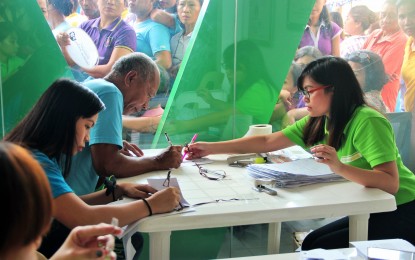
NEW CASH CARDS. Pantawid Pamilyang Pilipino Program (4Ps) beneficiaries troop to a bank in Tacloban City for the processing of cash cards. (Photo from FB page of DSWD Region 8)
TACLOBAN CITY -- The Department of Social Welfare and Development (DSWD) is eyeing to complete the distribution of new cash cards to 81,000 poor families in Eastern Visayas (Region 8) early this July.
DSWD Regional Director Restituto Macuto on Thursday said that releasing of cards for Pantawid Pamilyang Pilipino Program (4Ps) beneficiaries in four provinces of Eastern Visayas has started on June 12.
The cash cards issued by the Land Bank of the Philippines are meant for conditional cash transfer recipients who got their cash aid through over-the-counter transactions in banks and other financial institutions.
These EMV (Europay, MasterCard and Visa) cards are meant for 4Ps families in Samar, Eastern Samar, Northern Samar, and Southern Leyte provinces.
“We have already completed the release of cash cards for Biliran and Leyte between March and April. Biliran has only 4,000 beneficiaries while for Leyte, the Veterans Bank handled the card production for 60,000 families,” Macuto said.
The new cash cards can be used in any Land Bank ATM outlets without additional charge or in any bank with additional charges of PHP10.
After the distribution of new cards, the DSWD will start the process of “recarding” for recipients who are still using non-EMV cards. The region has more than 280,000 4Ps beneficiaries as of this year.
The conditional cash transfer program locally known as 4Ps, is a government program that provides conditional cash grants to the poorest of the poor in the country.
The program aims to break the cycle of poverty by keeping children aged 0-18 healthy and in school, so they can have a better future.
Households receive cash grants if children stay in school and get regular health check-ups, have their growth monitored, and receive vaccines. Pregnant women must get pre-natal care, with their births attended to by professional health workers.
Parents or guardians are required to participate in monthly community-based family development sessions to learn about positive child discipline, disaster preparedness, and women’s rights. (PNA)
